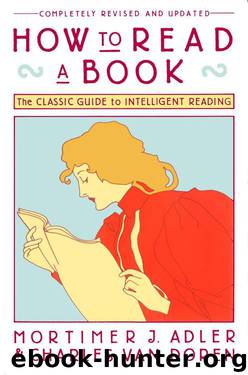How to Read a Book by Doren Charles Van;Mortimer J. Adler

Author:Doren, Charles Van;Mortimer J. Adler [Doren, Charles Van;Mortimer J. Adler]
Language: eng
Format: epub
Publisher: Simon & Schuster, Inc.
Published: 2011-05-10T04:00:00+00:00
15
SUGGESTIONS FOR READING STORIES, PLAYS, AND POEMS
The parallel rules for reading imaginative literature that were discussed in the last chapter were general ones, applying across the board to all kinds of imaginative literature—novels and stories, whether in prose or verse (including epics); plays, whether tragedies or comedies or something in between; and lyric poems, of whatever length or complexity.
These rules, being general, must be adapted somewhat when they are applied to the different kinds of imaginative literature. In this chapter we want to suggest the adaptations that are required. We will have something particular to say about the reading of stories, plays, and lyric poems, and we will also include notes on the special problems presented by the reading of epic poems and the great Greek tragedies.
Before proceeding to those matters, however, it is desirable to make some remarks about the last of the four questions that the active and demanding reader must ask of any book, when that question is asked of a work of imaginative literature.
You will recall that the first three questions are: first, What is the book about as a whole?; second, What is being said in detail, and how?; and third, Is the book true, in whole or part? The application of these three questions to imaginative literature was covered in the last chapter. The first question is answered when you are able to describe the unity of the plot of a story, play, or poem—“plot” being construed broadly to include the action or movement of a lyric poem as well as of a story. The second question is answered when you are able to discern the role that the various characters play, and recount, in your own words, the key incidents and events in which they are involved. And the third question is answered when you are able to give a reasoned judgment about the poetical truth of the work. Is it a likely story? Does the work satisfy your heart and your mind? Do you appreciate the beauty of the work? In each case, can you say why?
The fourth question is, What of it? In the case of expository books, an answer to this question implies some kind of action on your part. “Action,” here, does not always mean going out and doing something. We have suggested that that kind of action is an obligation for the reader when he agrees with a practical work—that is, agrees with the ends proposed —and accepts as appropriate the means by which the author says they can be attained. Action in this sense is not obligatory when the expository work is theoretical. There, mental action alone is required. But if you are convinced that such a book is true, in whole or part, then you must agree with its conclusions, and if they imply some adjustment of your views of the subject, then you are more or less required to make those adjustments.
Now it is important to recognize that, in the case of a work of imaginative literature, this fourth and final question must be interpreted quite differently.
Download
This site does not store any files on its server. We only index and link to content provided by other sites. Please contact the content providers to delete copyright contents if any and email us, we'll remove relevant links or contents immediately.
Cecilia; Or, Memoirs of an Heiress — Volume 1 by Fanny Burney(32544)
Cecilia; Or, Memoirs of an Heiress — Volume 2 by Fanny Burney(31939)
Cecilia; Or, Memoirs of an Heiress — Volume 3 by Fanny Burney(31928)
The Lost Art of Listening by Michael P. Nichols(7487)
Asking the Right Questions: A Guide to Critical Thinking by M. Neil Browne & Stuart M. Keeley(5755)
We Need to Talk by Celeste Headlee(5608)
On Writing A Memoir of the Craft by Stephen King(4925)
Dialogue by Robert McKee(4386)
Pre-Suasion: A Revolutionary Way to Influence and Persuade by Robert Cialdini(4216)
I Have Something to Say: Mastering the Art of Public Speaking in an Age of Disconnection by John Bowe(3872)
Elements of Style 2017 by Richard De A'Morelli(3339)
The Book of Human Emotions by Tiffany Watt Smith(3295)
Fluent Forever: How to Learn Any Language Fast and Never Forget It by Gabriel Wyner(3077)
Name Book, The: Over 10,000 Names--Their Meanings, Origins, and Spiritual Significance by Astoria Dorothy(2978)
Why I Write by George Orwell(2944)
Good Humor, Bad Taste: A Sociology of the Joke by Kuipers Giselinde(2941)
The Art Of Deception by Kevin Mitnick(2794)
The Grammaring Guide to English Grammar with Exercises by Péter Simon(2734)
Ancient Worlds by Michael Scott(2680)
